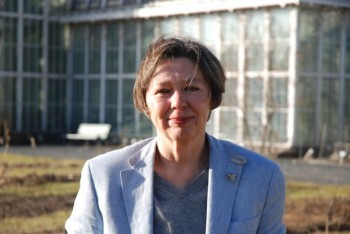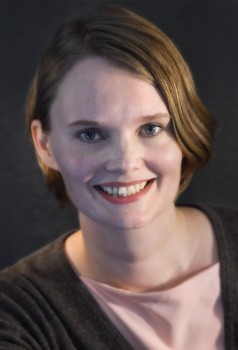Archive for November, 2014
And the winner is… Finlandia Prize for Fiction 2014
27 November 2014 | In the news
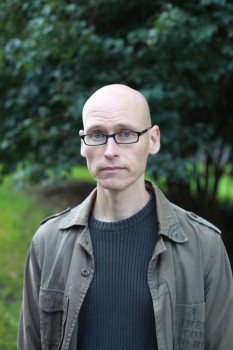
Jussi Valtonen. Photo: Markko Taina
The winner of the prize this year, worth €30,000 and awarded on 27 November, is He eivät tiedä mitä he tekevät (‘For they know not what they do’, Tammi) by Jussi Valtonen (born 1974), a psychologist and writer. The novel – 558 pages – is his third: it focuses on the relationship of science and ethics in the contemporary world, with an American professor of neuroscience, married to a Finn, as the protagonist.
Professor Anne Brunila – who has worked, among other posts, as a CEO in forest and energy industry – chose the winner. In her awarding speech she said: ‘The novel is an astonishing combination of perceptive description of human relationships, profound moral and ethical reasoning, science fiction and suspense…. I have never encountered a Finnish portrayal of our present era that is anything like it.’
The other five novels on the shortlist of six were the following:
Kaksi viatonta päivää (‘Two innocent days’, Gummerus) by Heidi Jaatinen is a story of a child whose parents are not able to take care of her; Olli Jalonen’s Miehiä ja ihmisiä (’Men and human beings’, Otava) focuses on a young man’s summer in the 1970s. Neljäntienristeys (‘The crossing of four roads’, WSOY), a first novel by Tommi Kinnunen, is a story set in the 20th-century Finnish countryside over three generations. Kultarinta (‘Goldbreast’, Gummerus) by Anni Kytömäki is a first novel about generations, set in the years between 1903 and 1937, celebrating the Finnish forest and untouched nature. Graniittimies (‘Granite man’, Otava) by Sirpa Kähkönen portrays a young, idealistic Finnish couple who move to the newly-founded Soviet Union to work in the utopia they believe in.
A long list of good novels
27 November 2014 | In the news
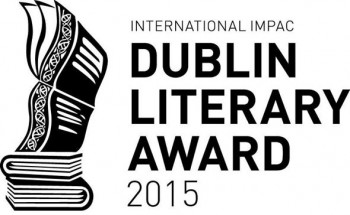 The longlist for the International IMPAC Dublin Literary Award 2015 has been announced and, among the 142 translated novels – from 39 countries and 16 original languages – are two from Finland.
The longlist for the International IMPAC Dublin Literary Award 2015 has been announced and, among the 142 translated novels – from 39 countries and 16 original languages – are two from Finland.
Mr Darwin’s Gardener by Kristina Carlson (Peirene Press, UK, 2012), a novel set in the 1860s England, is translated by Emily and Fleur Jeremiah (see the extracts in Books from Finland).
Cold Courage, a thriller by Pekka Hiltunen (Hesperus Press, UK), is translated by Owen Witesman. Both entries were nominated by Helsinki City Library.
Among the authors writing in English are Margaret Atwood, J.M. Coetzee, Roddy Doyle, Stephen King, Jhumpa Lahiri, Thomas Pynchon and Donna Tartt.
This literary award was established by Dublin City, Civic Charter in 1994. Nominations are made by libraries in capital and major cities throughout the world, on the basis of ‘high literary merit’. In order to be eligible for consideration in 2015 a novel translated into English must be first published in the original language between 1 January 2009 and 31 December 2013.
The award for a translated novel is worth €75,000 to the author, €25,000 to the translator. The shortlist of ten titles will be announced by an international panel of judges in April 2015, the winner in June.
We’ll be keeping our fingers crossed for our ex-Editor-in-Chief Kristina Carlson!
You may say I’m a dreamer
25 November 2014 | Fiction, poetry
Prose poems from Tärnornas station – en drömbok (‘The Lucia Maids’ Station – a dream book’‚ Ellips, 2014). Introduction by Michel Ekman
I nurse a very small, perfectly formed child. It’s a girl. She smiles openly at me, even though she is so small. There is no doubt, neither about that nor anything else. The girl is the size of a nib pen, and just as exclusive. The nursing is going very well, it doesn’t hurt, and she can suckle without any problems. We are both at ease and yet awake, not introspective. The girl has intelligent eyes.
The milk keeps flowing.
Nothing runs dry.
Everything is obvious and neither of us is surprised. Just the fact that she is so small. Like a fountain pen. She is swathed in strips of bird cherry white bandages – like the ones mum had in her summer medicine cabinet – a cocoon, a chrysalis, but she’s not cramped, just secure. It smells good around us. I nurse my daughter who is perfect and the right size.
![]()
‘The Lion of the North’ wins the non-fiction Finlandia Prize
25 November 2014 | In the news
The Finlandia Prize for Non-Fiction 2014, worth €30,000 and awarded by Suomen Kirjasäätiö (The Finnish Book Foundation), went to the historian and author Mirkka Lappalainen on 19 November for her book on a 17th-century Swedish king.
Finlandia Prize for Non-Fiction 2014, worth €30,000 and awarded by Suomen Kirjasäätiö (The Finnish Book Foundation), went to the historian and author Mirkka Lappalainen on 19 November for her book on a 17th-century Swedish king.
The winning entry, entitled Pohjolan leijona, Kustaa II Adolf ja Suomi 1611–1632 (‘The Lion of the North. Gustavus II Adolphus and Finland 1611–1632’, Siltala), was chosen by from a shortlist of six finalists by Heikki Hellman, journalist and Dean of the School of Communication, Media and Theatre in Tampere. According to him, ‘Pohjolan leijona is an exceptionally well-written narrative for a non-fiction book; the author uses both earlier literature and numerous primary and secondary sources with great skill. Lappalainen succeeds in demonstrating how, during the reign of Gustavus II Adolphus, both Sweden and its easterly province, Finland, began to develop an organised society with its structure of officials and bureaucracy, how jurisdiction replaced the arbitrary rule of the aristocracy and how it was only then that Finland developed its role as part of Sweden. Pohjolan leijona sweeps the reader along and helps us to understand where we have come from and who we are.’
Hellman also commented on the growing practice of publishing non-fiction texts in English only: ‘Research is not done only for other scholars; it must also be relevant to people’s lives and be brought to their attention. We must also publish in our mother tongue, or else it will not survive as a language for research. This is one of the reasons why non-fiction is so necessary.’
Mirkka Lappalainen has received other prizes for her work. Susimessu (‘Wolf mass’), for example, was voted History Book of the year in 2010.
Angry epic heroes?
20 November 2014 | This 'n' that
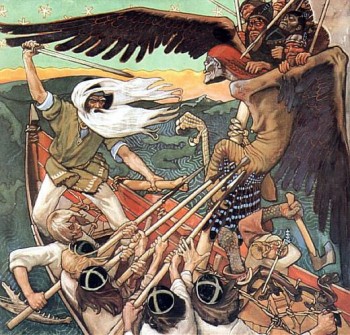
Action man: Väinämöinen fights the Hag of the North. Painting by Akseli Gallen-Kallela, 1896 (Turku Art Museum). Wikipedia
The Finnish national epic, the Kalevala, is the inspiration for a grand-scale film trilogy project. It involves employees of several entertainment media companies working on it in their free time. The Finnish entertainment media company Rovio that became famous for its Angry Birds game, and the Finnish-born video game company Supercell have sponsored – with other 13 media companies – the trailer: see IronDanger.
Financing is still in the planning stages, but it is hoped that the first part will be ready in 2017 when Finland celebrates its centenary year.
According to Rovio’s Chief Marketing Officer, Peter Vesterbacka, the film will be ‘adequately’ faithful to the original work. In an interview published on 19 November on the website of the Finnish Broadcasting Company YLE, he says that even if the landscape will look very Finnish, the intention is to ’tell the story to make it clear that it’s not about a bunch of old pensioners. These are young, heroic, epic heroes‘.
So, vaka vanha Väinämöinen – ‘Väinämöinen, old and steadfast’ – , the main character of the epic, the great shaman and the bard, the tragic hero, is to be kicked off the cast, because he’s, well, elderly?
Funny that the bearded wizard Gandalf of Lord of the Rings was not dismissed from the film due to his age, even though he does indeed looks as old as the hills of Gondor. (By the way, Väinämöinen has been ‘identified as a source for Gandalf’…)
It remains to be seen how the younger Kalevala crowd will deal with all that action. Who, for example, is going to sink the impetuous Joukahainen into a bog by singing, then?
The Finlandia Junior Prize 2014
20 November 2014 | In the news
 Maria Turtschaninoff’s third fantasy book for young people, Maresi. Krönikor från röda klostret / Maresi. Punaisen luostarin kronikoita (‘Maresi. Chronicles of the Red Convent’, Schildts & Söderströms; Finnish translation by Marja Kyrö, publisher Tammi) was awarded the Finlandia Junior Prize, worth €30,000, on 20 November.
Maria Turtschaninoff’s third fantasy book for young people, Maresi. Krönikor från röda klostret / Maresi. Punaisen luostarin kronikoita (‘Maresi. Chronicles of the Red Convent’, Schildts & Söderströms; Finnish translation by Marja Kyrö, publisher Tammi) was awarded the Finlandia Junior Prize, worth €30,000, on 20 November.
The winner was chosen by the scriptwriter and film director Johanna Vuoksenmaa who, in her awarding speech, said that it is ‘an exceptionally powerful fantasy book which, in addition to telling an exquisite, wise and exciting story, also provides a welcome correction to the gender division of fantasy book characters, which has been slightly skewed ever since Tolkien. Maresi reminds me that even today there are places in the world where readers are not sought for books, where knowledge is not on offer to young, thirsty minds. People’s opportunities to know and learn are limited and human rights trampled upon.’
The other five candidates were the following:
Written and illustrated by Saku Heinänen, Zaida ja lumienkeli (‘Zaida and the snow angel’, Tammi) is the story of a little girl whose school days are not always happy; Puiden tarinoita. Puuseppä (‘Stories by trees. The carpenter’, Books North) is a fairy-tale written by Iiro Küttner and illustrated by the graphic artist and cartoonist Ville Tietäväinen; Jyri Paretskoi’s first novel Shell’s Angles ja Kalajoen hiekat (‘Shell’s Angles and the Kalajoki sands’, Karisto) is a humorous story for young teenagers; Min egen lilla liten / Oma pieni pikkuruinen (‘My own tiny little thing’, Schildts & Söderströms, Teos) is a picture story about longing for closeness told by Ulf Stark and illustrated by Linda Bondestam; a picture book about a little squirrel by Mila Teräs, Olga Orava ja metsän salaisuus (‘Olga Squirrel an the forest’s secret’, Lasten Keskus) is illustrated by Karoliina Pertamo.
Prize for the best debut book
20 November 2014 | In the news
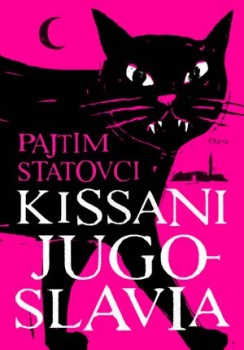 The Helsingin Sanomat literature prize for the best first work, written in Finnish, for 2014 was awarded on 13 November to Kosovo-born Pajtim Statovci, 24, for his novel Kissani Jugoslavia (‘Yugoslavia my cat’, Otava – see translated extracts here).
The Helsingin Sanomat literature prize for the best first work, written in Finnish, for 2014 was awarded on 13 November to Kosovo-born Pajtim Statovci, 24, for his novel Kissani Jugoslavia (‘Yugoslavia my cat’, Otava – see translated extracts here).
The choice was made by a five-strong jury from a total of 65 books. The prize, which was this year awarded for the 20th time, is worth €15,000.
Among the ten finalists were a collection of essays, three collections of poetry and six novels. According to the jury, Statovci’s novel, ‘drowns the reader, after a realistic description of events, in a dreamlike, lyrical vision. This kind of writing is not taught anywhere. The skill either resides in the writer or it doesn’t.’
Erkki Tuomioja: Siinä syntyy vielä rumihia. Poliittiset päiväkirjat 1991–1994 [Heads will roll. Political diaries 1991–1994]
20 November 2014 | Mini reviews, Reviews
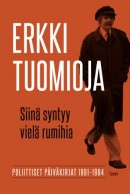 Siinä syntyy vielä rumihia. Poliittiset päiväkirjat 1991–1994
Siinä syntyy vielä rumihia. Poliittiset päiväkirjat 1991–1994
[Heads will roll. Political diaries 1991–1994]
Editor: Veli-Pekka Leppänen
Helsinki: Tammi, 2014. 680 pp., ill.
ISBN 978-951-31-7555-9
€39, hardback
Erkki Tuomioja (born 1945) has for a long time served as a member of parliament and as Finland’s foreign minister. A left-wing Social Democrat, Tuomioja has since his youth been known as a sharp-minded social debater as well as a writer and researcher. His publications include a biography of his grandmother, the Estonian-born eminent writer and dramatist Hella Wuolijoki. These fascinating political diaries from the early 1990s cover such topics as the break-up of the Soviet Union, Finland’s increasingly close integration with western Europe, and with the disputes about the Social Democrat leadership and the remarkable rise of Martti Ahtisaari, who came in from outside to become the party’s presidential candidate, and ultimately the country’s president. Tuomioja’s characterisations of Finnish politicians and political life are apt and plain-spoken, with particular criticism reserved, for example, for President Ahtisaari. Tuomioja does not conceal his own doubts and disappointments, and accepts that some of his views of the time do not correspond to those that he holds today. The editor provides the reader with a summary of the important events at the beginning of each month.
Translated by David McDuff
Year of the cat
13 November 2014 | Fiction, Prose
Extracts from the novel Kissani Jugoslavia (‘Yugoslavia, my cat’, Otava 2014). Introduction by Mervi Kantokorpi
I met the cat in a bar. And he wasn’t just any cat, the kind of cat that likes toy mice or climbing trees or feather dusters, not at all, but entirely different from any cat I’d ever met.
I noticed the cat across the dance floor, somewhere between two bar counters and behind a couple of turned backs. He loped contentedly from one place to the other, chatting to acquaintances in order to maintain a smooth, balanced social life. I had never seen anything so enchanting, so alluring. He was a perfect cat with black-and-white stripes. His soft fur gleamed in the dim lights of the bar as though it had just been greased, and he was standing, firm and upright, on his two muscular back paws.
Then the cat noticed me; he started smiling at me and I started smiling at him, and then he raised his front paw to the top button of his shirt, unbuttoned it and began walking towards me. More…
Shortlist for Finlandia Prize for Non-Fiction 2014
13 November 2014 | In the news
 The shortlist for the Finlandia Prize for Non-Fiction 2014 – worth €30,000 – was announced on 5 November by the chairperson of the jury, Susanna Pettersson, Director of the Ateneum Art Museum. The works on the list of six are as follows:
The shortlist for the Finlandia Prize for Non-Fiction 2014 – worth €30,000 – was announced on 5 November by the chairperson of the jury, Susanna Pettersson, Director of the Ateneum Art Museum. The works on the list of six are as follows:
Pohjolan leijona, Kustaa II Adolf ja Suomi 1611–1632 (‘The lion of the North. Gustavus II Adolphus and Finland 1611–1632’, Siltala) by the historian and author Mirkka Lappalainen deals with the implications of actions of the mighty Swedish king on the part of the kingdom that was known as Finland.
Herkkä, hellä, hehkuvainen – Minna Canth (‘Sensitive, gentle, radiant – Minna Canth’, Otava) is a fresh biography of the Finnish pre-feminist author (1844–1897), a popularised version of a dissertation by Minna Maijala.
Karanteeni. Kuinka aids saapui Suomeen (‘Quarantine. How Aids came to Finland’, Siltala) by Hanna Nikkanen & Antti Järvi records the history of the disease, its arrival and consequences in Finland.
Operaatio Elop (‘Operation Elop’, Teos) by Pekka Nykänen & Merina Salminen is the story of the mobile phone company Nokia in its declining years and its Canadian CEO (2010–2013) Stephen Elop, who did not become the saviour of the company on the global market.
Usko, toivo ja raskaus. Vanhoillislestadiolaista perhe-elämää (‘Faith, hope and pregnancy’, Atena) by Aila Ruoho &Vuokko Ilola focuses on the family life, particularly the status of the woman, of a fundamentalist religious community in Finland.
Tulisaarna. Einojuhani Rautavaaran elämä ja teokset (‘Fiery sermon. Life and works of Einojuhani Rautavaara’, Teos) by Samuli Tiikkaja (journalist, music critic and researcher) is a biography of the composer Einojuhani Rautavaara (born 1928).
The winner – according to the rules of the prize, it will be given to a deserving Finnish generalist non-fiction book – will be chosen by Heikki Hellman, journalist and Dean ofthe School of Communication, Media and Theatre in Tampere, on 19 November.
Panu Rajala: Tulisoihtu pimeään. Olavi Paavolaisen elämä [A torch into the darkness. The life of Olavi Paavolainen]
13 November 2014 | Mini reviews, Reviews
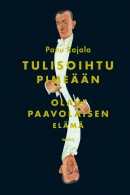 Tulisoihtu pimeään. Olavi Paavolaisen elämä
Tulisoihtu pimeään. Olavi Paavolaisen elämä
[A torch into the darkness. The life of Olavi Paavolainen]
Helsinki: WSOY, 2014. 624 pp., ill.
ISBN 978-951-040254-2
€32.90, hardback
In the 1920s Olavi Paavolainen (1903–1964) became the charismatic figurehead of the influential Tulenkantajat (‘Firebearers’) movement, which placed emphasis on internationalism and modernism. After the movement broke up Paavolainen worked as a prominent cultural leader and critic who knew how to provoke and to arouse admiration. The original travel book he wrote about Nazi Germany in peacetime is still read, as is his book Synkkä yksinpuhelu (‘A sombre monologue’, 1946), based on the diaries he kept during the Second World War. The criticism the book received (and doubts about its author’s ‘wisdom of hindsight’) contributed to Paavolainen’s silence as a writer. Although in the 1950s and 1960s as a director he brought about a flourishing of radio drama at the Finnish Broadcasting Company, he became an alcoholic. Much has been written about Paavolainen, but author and researcher Panu Rajala’s popular biography has managed to find new perspectives and gives a vivid portrayal of Paavolainen’s personality, the writers he knew, the colourful story of his complex relationships with women, and his travels. There is less analysis of his literary production, though the content and reception of his books are discussed.
Translated by David McDuff
Wow-factor?
6 November 2014 | This 'n' that
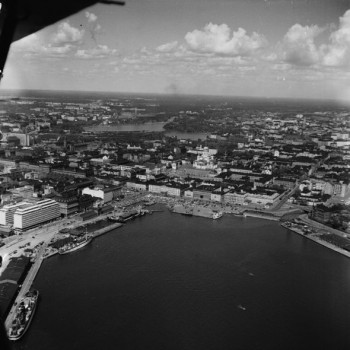
Helsinki harbour: aerial photo from the German Quick magazine, by Volker von Bonin, 1952. The proposed site for the Guggenheim building is bottom left. Photo: Helsinki City Museum
The winner of the Guggenheim Helsinki Design Competition, organised by the Solomon R. Guggenheim Foundation, will be announced in June 2015. ‘An innovative, multidisciplinary museum of art and design’, the winning building, if it will be realised, is likely to be a new ‘architectural dream’.
1,715 submissions were received from 77 countries; a shortlist of six finalists will be announced on 2 December.
In 2012 when the Guggenheim project (see our post from 2012) began to be discussed, the deep ranks of Helsinki taxpayers protested in public by saying that they did not want a costly new monument (building costs 130 million euros) in the city for which it would have been necessary to pay – in addition to maintenance costs – ca. 26 million euros to the American brand for the use of its name during the next 20 years. Finally the City Council voted 8-7 against the mayor’s motion to build the museum.
A comparison: the building costs of an urgently needed new children’s university hospital are 160 million euros: as the state was not able to fully finance the project in the near future, it was decided (in 2013) that 30 million euros would be raised by private sponsors and the general public in order to ensure the beginning of the construction work in 2014. (The goal was reached last August, but the fund-raising campaign will go on to decrease the loan capital, 50 million.) This project has been referred to by the opposers of the Guggenheim project in particular: if the state cannot provide the funds for a national children’s hospital, how could – and why should – it commit itself, albeit with smaller sums, to sponsoring an American art museum in Finland?
No money from the state was promised. No art-minded private sponsors of a future Guggenheim announced themselves in the public either. It turned out, however, that enough private sponsor money was available for an international architecture competition: in 2013 a tentative, central site for a future Guggenheim building was reserved for the competition project, for two years, in Helsinki harbour.
Since that, a group of independent arts organisations has issued a call for submissions for alternative ideas: ‘The next Helsinki’: a new competition aims at bringing forth projects that ‘attach artistry to all aspects of everyday urbanism’, and it is open to all, not just ‘starchitects’, ‘…because the solution is not simply an urban designer’s or artist’s task.’ Deadline is 2 March, 2015.
The organisations taking part are Checkpoint Helsinki, G.U.L.F. (Global Ultra Luxury Faction), Occupy Museums and Terreform, New York. ‘The next Helsinki’ states: ‘The Guggenheim Foundation has launched a design competition on one of Helsinki’s most valuable and compelling physical sites for a new Guggenheim building, in hopes of a transformation akin to the “miracle” in Spain [Bilbao]. The City of Helsinki is tempted to spend hundreds of millions of municipal euros in return for the benefits of the branding of the city with someone else’s mark. Is this really the best use for the site and tax money?’
It remains to be seen who will be the winners, and what will be won.

